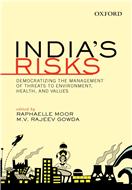This project explored how different groups in India deal with risks and uncertainties related to advances in science and technology. It ran from 2006-2011.
Pharmaceuticals, vaccines, crop biotechnology and nanotechnology are all areas where rapid developments in science and technology are seen as key to economic growth, nationally and in the global economy. But as new technologies are delivered in diverse settings, with different local needs and policy priorities, a range of risks and regulatory challenges arise.
This project has explored the different ways that corporations, state agencies, scientific institutions, farmers and consumers understand and seek to respond to such risks in the context of the new ‘knowledge economy’.
 This project was made possible with funding by UKIERI, the UK-India Education Research Initiative, and has involved a series of workshops, exchanges and capacity building activities.
This project was made possible with funding by UKIERI, the UK-India Education Research Initiative, and has involved a series of workshops, exchanges and capacity building activities.
STEPS members working on this project:
- Ian Scoones – Convenor
- Erik Millstone – Research Fellow
Project partners:
- Rajeev Gowda – Professor in Economics and Social Sciences, Indian Instiute of Management, Bangalore
Project activities:
 Book: India’s Risks
Book: India’s Risks
India’s Risks: Democratizing the Management of Threats to Environment, Health, and Values
Published by Oxford University Press India
June 2014
edited by Raphaelle Moor and M.V. Rajeev Gowda
This edited volume draws together insights presented at the 2011 Innovation, Sustainability and Development conference at NISTADS in India, revised and updated for publication as a book.
The Knowledge Society Debates:
- Three workshops/events in Hyderabad, Bangalore and Delhi
- Seminar Special Issue including 11 articles, funded by UKIERI
- Report: The Knowledge Society Debates
- Blog: Knowledge Society debates
- Blog: Truth, politics and the knowledge society
- Blog: A battle of enlightenments
- Video: on Blip TV
- Video on You Tube
- Media: How inclusive is knowledge? The Hindu covers the STEPS Knowledge Society debates, 11 January 2009
- Media: Knowledge Society Debates today Deccan Herald, 9 January 2009
- Media: Knowledge Society debate comes to town The Times of India. 3 January 2009
- Media: Know can do Time Out Bangalore covers the Knowledge Society debates, 26 December 2009
The Innovation, Sustainability and Development Conference
Held at NISTADS in Delhi in June 2011, and coordinated by UKIERI network partner Dinesh Abrol, the conference was linked to the STEPS Centre’s ‘New Manifesto’ and was supported by UKIERI
- Full programme and links to all 65 videos of presentations (New Manifesto website)
The findings of the conference were presented at the 2011 Globelics event
- Blog: Lessons from India’s experience of innovation politics shared at Globelics, by Adrian Ely
- Blog: Innovation begins at home, by Adrian Ely
- Blog: Innovation for Social Inclusion and Sustainable Development, by Adrian Smith
And in 2012 at the Planet under Pressure conference:
The India at Risk conference and book
Find out more on the conference website.
The Biotechnology in Bangalore seminar
- Seminar event page Funded by UKIERI
- Presentations on Slideshare
- Ian Scoones blog: Biotech business in Bangalore: a decade of hype and hope?
- Ian Scoones blog: Getting hotter: regulating biotechnology in India
- A view from India, Nature Trade Secrets blog:
- The Biotech Blog
- IDS News and Views
The Risk, Competitiveness and Sustainability Conference
Find out more on our Conference overview page. Funded by UKIERI
- Conference programme and speaker profiles (pdf)
- Event details – IIMB website
- IIMB Facebook page about the conference
- Presentations from the conference (Scribd)
- STEPS Centre blog
Project films
Bangalore: From Garden City to Garbage City, by Jake Cornwall Scoones (2013). Bangalore is one of the fastest-growing cities in the world. With a population approaching 9 million, it produces around 4000 tonnes of solid waste each day. Most of this is dumped in land fill sites near villages on the city’s outskirts. But is this the best way of dealing with the waste problem? Are there other solutions less damaging to both people and the environment? This film is about what happens to Bangalore’s waste, the controversies that it has provoked, and some of the potential solutions.
Bangalore: Living in a Global City, by Jake Cornwall Scoones (2012). A film exploring the positive and negative effects of rapid urbanisation in Banglalore, once a ‘pensioner’s paradise’, now a global information technology hotspot, home to Infosys and Wipro, and one of the fastest-growing cities in the world. What tensions and inequalities are simmering underneath the glossy surface of the city?